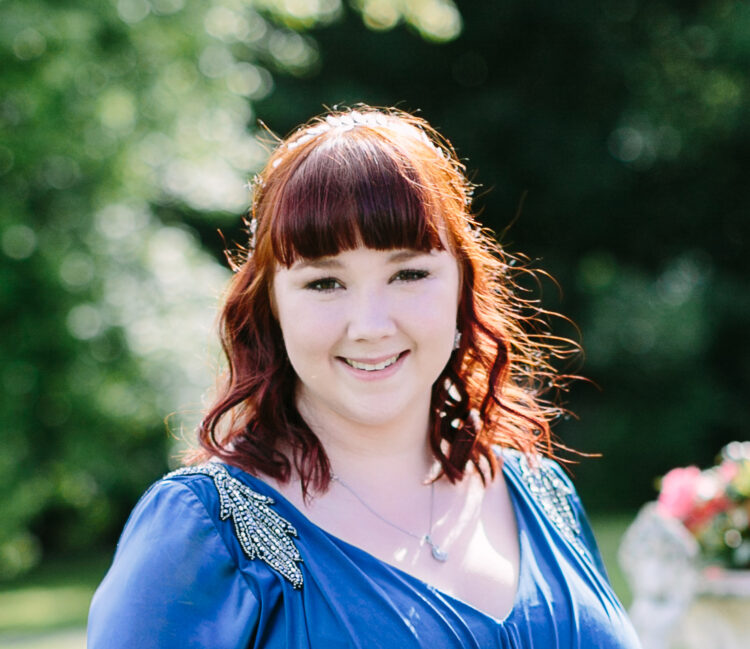
Irish woman Sinéad Keating was diagnosed with bipolar disorder in 2008, and after a turbulent decade, she now feels more in control of her life. Here, in her own words, Sinéad tells her story of managing her illness, and planning for pregnancy — a point she never thought she’d reach
There is a lot of stigma and unknowns when it comes to bipolar disorder, and mental health in general. In the midst of a mental illness, the idea of settling down, working in a job you love and starting a family can seem all too far away. Sinéad Keating has spent years managing her illness, and feeling like her life was on hold in her 20s, she is now at a point where she feels hopeful for the future. Sinéad is speaking at a major national conference on the Future of Depression & Bipolar Disorder, hosted by Aware, for members of the public in University College Dublin on Saturday, October 12. Here, she explains her journey to diagnosis, and how to plan for a pregnancy when you have bipolar disorder.
Getting diagnosed
“It was a bit of a long process to get diagnosed. It was January 2008, I woke up in the middle of the night with a severe gut pain that didn’t go away it was really intense. I went to see my GP in the student centre at UCD where I was a student at the time. She said I had a kidney infection and my bowl was inflamed, and she just happened to say to me that bowel issues often come with stress. I said I am actually feeling really stressed. So I agreed to see a counsellor, I saw her for a few months and she said my mood wasn’t improving and asked me to consider seeing a psychiatrist. At that stage we had been doing some talking therapy and some CBT and some skills to manage anxiety and I just wasn’t feeling any better. I saw the psychiatrist in May, he asked me a lot of questions about my childhood and my teens and he prescribed me a small dose of medication. Over the course of six months my medication went up and we were continuing to talk about how I felt. I suspected that I had bipolar and I knew that it meant a lot to me to have the diagnosis. I asked him if that’s what I had, and I asked him if I had type II, as I knew that there was more than one type of bipolar. I wasn’t having massive highs. I wasn’t having psychosis. I asked him and he said yes. That was in November. It had been the guts of a year to get to that term. It was quite a physical feeling of relief. I realised that it wasn’t me, it was something else that was happening to me, and that it happens to other people. I knew that it was very serious and I knew that I would have it forever, but it was still a relief to know. I had no idea at that stage what was going to come down the line. What I was aware of at the time I got my diagnosis was that I was going to be in for a stigma. I came out of that appointment, and sat down for about an hour and had a long think about what I wanted to do in terms of telling people and how to deal with it. I am quite open anyway and I know that talking about things makes me feel better, so I knew that was what I wanted to do. That was the only foresight that I had at that time. With work and with juggling the illness itself, I had no idea what was really coming.”
What is bipolar II
“When I talk to people about being bipolar, most people who wouldn’t know somebody with bipolar tend to have a vague understanding of bipolar 1 which is associated with the massive highs and crushing lows. Type 2, people don’t know as much about it. People tend to think of bipolar as a mood disorder but I don’t anymore. I describe it as a disorder of brain function, as the disorder doesn’t just affect my mood. I saw a video by the founder of Aware, describing bipolar. He explained that when you’re in a depressed stage, your brain function slows down. Then when you are in a manic, or a hypomanic phase, your brain speeds up. All of my episodes, be they one day or two weeks, it has been because my brain over functions. My brain is moving too quickly. I get mixed episodes, which is confusing to explain. It feels like a downer, I am very sad, very anxious, and I am hugely overwhelmed. It’s not that my brain is shutting down, I just can’t cope with any more stressors. My thinking is not slowed down, my thinking has sped up and I can’t keep up with those thoughts. Sometimes I will stumble over my words. It feels like there is a hurricane in my head. It is just thoughts and words and memories swirling around me and I am just trying to wait for it to pass. If I presented to a doctor and didn’t know I had bipolar, I might say I feel really sad and anxious and it may seem like to someone else that I am experiencing depression or feeling very low. But it is all because my thoughts are going too quickly. I recognise that it is actually the other way, my brain is going too fast, so that I need to rest. Even though I get extreme cases of restlessness, with exhaustion, which is a very unpleasant combination.”
Living with bipolar II
“I was two months into my masters when I got the diagnosis. So that year was a borderline disaster. I graduated with an honours degree, somehow, but I had always wanted to go on to do a PhD, but that was no longer going to happen, not with this illness. My health was so dodgy. The year wasn’t what I wanted it to be, so I stayed in the part time retail job that I had. I just sort of managed. With my illness, I find the longer I have it, the more experience I have of having it, and I get to know myself with it. It has taken a long time to fully understand how it manifests. I needed to have the diagnosis to know what to look out for, and I needed the years of experience to understand what was going to happen for me, how I would feel, what worked and what was different.”
Challenging times
“With starting medication, it takes quite a long time to figure out what works and what doesn’t work. It was probably five or six years to get to that point. I was rocky for a few years. I went into hospital in 2012, and again in 2013. It’s tough but it’s great that it’s there. You know hospital wasn’t a nasty experience, it was actually a really positive experience. I’d be lying if I said I was grateful for that experience, obviously no one enjoys being unwell. But it was good to be able to go into hospital. The hospital I went to was lovely, it was very supportive. There is something really lovely about when you’re struggling, knowing that there is a place you can go where people with qualifications and who know how to deal with it, are supporting you 24/7. I feel fortunate that I was able to go into hospital because I had private health insurance. People can have the idea that hospital is like One Flew Over The Cuckoo’s Nest. There is still quite a disparity between the public and the private sector. It felt like such a privilege to be able to go into the private hospital then, and it feels even more like a privilege now looking back especially with all you hear on the news and the stories you hear from other people waiting for care on the public system. Now I know when I need to pull back and take time off work. It doesn’t stop the episodes from coming, but it’s about managing it as soon as I become unwell. I know what to do now when I am not feeling well. It’s very different for everybody, as each person with bipolar is not going to be on the same medication. With medication and bipolar, you are trying to get a delicate balance. Everybody is different because the illness manifests itself differently. “
Trying for a baby
“My husband and I wanted to have children, so when I got to 30 and things were going quite well, I realised I needed to start planning now. This was so I could find out what my options are. I met with my GP and my consultant and I was referred to a perinatal psychiatrist in the Rotunda. He is speaking on the same panel as I am at the conference (see below). He explained that there are five different options for women with bipolar who want to have a baby and the first one is coming off medication. I wanted to try that, as I am at a stage in my life where I am considerably stable. My mental health is based on several different pillars and medication is just one of those. It’s about self care and knowing my own illness too, not just medication. My husband is absolutely amazing, and my family and friends are there for me, and exercise is so important too. With all these other pillars being so strong, I was willing to give it a go and see how I got on. The process is low and slow, and I have been doing it for two years now. I am on 10% of the medication that I was on, and I am staying there, because I don’t think coming off medication completely is for me. I am so pleased that I was able to reduce medication so significantly, it has gone better than I was hoping.”
Cutting back on medication
“Being on less medication has improved my life in other ways too. Being well improves my life. I was able to go back to work part-time in April of last year. I hadn’t worked for years. Being able to work in the mental health sector has been great too, as I am so interested in it and I am in a job I love which has a huge impact on me. It was my decision to reduce medication, I could have tried to have a baby on the medication that I was on, but I am happier to try this way. At the moment my husband and I are in the process of trying to buy a house. But hopefully within the next year we can look to start our family. I wasn’t aware of how lonely the process of reducing medication would be. It’s a long time to take two years to get to this stage, where only now I feel like I can be like everybody else. Now I am like anyone who is thinking about starting a family. I felt the weight of that decision, and it was strange starting to reduce my medication then as at that point I wasn’t ready to start a family, I was just preparing. I had never heard any other stories like mine, of women who had mental illnesses who wanted to get pregnant, and who had made the decision to reduce medication. It was all scary and lonely. My husband is amazing, but I did feel the weight of that decision. I am so lucky it worked out, as it so easily may not have. My GP explained to me that it was really helpful to her that I was responsible in how I approached this decision. I know that that might not be possible for every woman or pregnant woman with a mental illness to do that, to think that far ahead. Maybe there are people who don’t have the support that I have. In my husband and my doctors and my own self awareness, I feel massively privileged that I had the wherewithal to say, ‘actually I think it’s time to think about this’. I have an amazing consultant, and I was able to access a perinatal psychiatrist. I believe everyone can access a perinatal psychiatrist if they have a mental illness and want to or are pregnant, but there are only three in the country. There is a bit of a wait. I am just very lucky that I had those pieces together in my life that I could plan ahead. It makes me, my husband and my doctors more comfortable going forward.”
Being in control
“It is so nice to be able to have a life. I didn’t necessarily think this would happen for me. All of my twenties were spent being ill. I feel like I wasn’t able to make the choices that I wanted when it came to going into further education. I am also now only starting out in work ten years later than everyone else I know. Now I am able to think about starting a family and buy a house and that was all completely unthinkable until the time I turned 30. I suppose even though it felt kind of cruel getting a diagnosis so young, in a way I am also lucky that I got that. It can really mess with your life, it is a really tricky illness to live with. In that way I am so lucky that I got diagnosed early, so I could take the time to manage it and now it’s not too late or anything for me to have a great life.”








